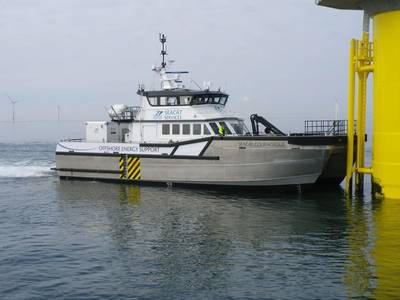Offshore energy support vessel (OESV) operator Seacat Services has completed its latest investment in its fleet, launching two vessels with the capacity for 24 industrial personnel – the newly-accepted Seacat Enterprise, and the upgraded Seacat Courageous.
These boats are among the first wave of offshore energy support vessels to be certified under the new HS-OSC (High Speed – Offshore Service Craft) code, which now allows vessels under 500 metric tons to carry up to 60 industrial personnel. High Speed Utility Vessel (HSUV) Seacat Enterprise is the first vessel to be both built and registered in the U.K. under this new code.
Ahead of a busy offshore wind construction phase, this increase in personnel capacity offers a significant advantage from a logistical perspective and enhances the versatility of the Seacat Services fleet, the company said. With the next raft of new construction sites in remote and deep waters – equating to significant time offshore – there is a growing market need for an increase in OESV size and technician complement.
Both Seacat Enterprise and Seacat Courageous are ‘dual-classified’ under the recently introduced HS-OSC code and the existing Workboat Code, which means that they can be licensed to carry 12 passengers under Workboat Code rules, and, as an HS-OSC craft, carry a further 12 industrial personnel.
In making this distinction between passengers and industrial personnel, HS-OSC recognizes the extensive safety training undertaken by offshore wind technicians and affords vessel operators greater versatility in meeting the demands of supporting large-scale construction projects.
It has also enabled the development of a new category of workboat for the offshore wind sector. Seacat Enterprise is the first U.K.-built HSUV, a 27m catamaran that is the most recent product of a long-term collaborative R&D program between Seacat Services, South Boats IoW and Alicat Marine Design.
She features a substantially enhanced cargo and fuel carrying capacity that enables her to carry up to four 20ft containers in addition to 24 personnel and ship’s crew. This extra fuel capacity allows Seacat Enterprise to remain operational for significantly extended periods between port calls, enabling her to create operational efficiencies by supporting both larger vessels and other offshore assets.
Seacat Services’ second HS-OSC-certified vessel, 26m Seacat Courageous, was originally launched in February 2015 as a 12-seater, but thanks to a modular design has now been refitted and upgraded to become a 24-seater. She features a 26,000-litre fuel tank, and additionally a foredeck that can accommodate up to two 20ft equipment containers.
“The introduction of the HS-OSC code is a welcome development for the UK offshore wind sector, enhancing the service provided by vessel operators like Seacat Services as we gear up for the upcoming construction phase,” said Ian Baylis, Managing Director, Seacat Services.
“The acceptance of Enterprise and upgrade of Courageous are part of our continuing investment in the fleet, and an ongoing program of significant scheduled refits to our vessels that will ensure that each and every one of our boats continues to meet the very highest standards. This investment in technology has been matched by expansions to our support facility and shore-based teams.”
“In short, we’re well-placed to continue supporting the fast moving offshore wind sector and the ‘industrial personnel’ driving construction and operations forward.”
According to Seacat, HSUVs like Seacat Enterprise are the future of deepwater construction, operations and maintenance support – fulfilling a number of hugely important roles and complementing the activities of other offshore wind vessels.
Both Enterprise and Courageous capitalize on a ‘proven formula’ that Seacat has grounded throughout its entire fleet, the company said. While there is no one size fits all solution for an industry as dynamic as offshore wind, Seacat never compromises on its core ingredients – which means that each of its 14 vessels responds directly to the operational needs of the industry.














